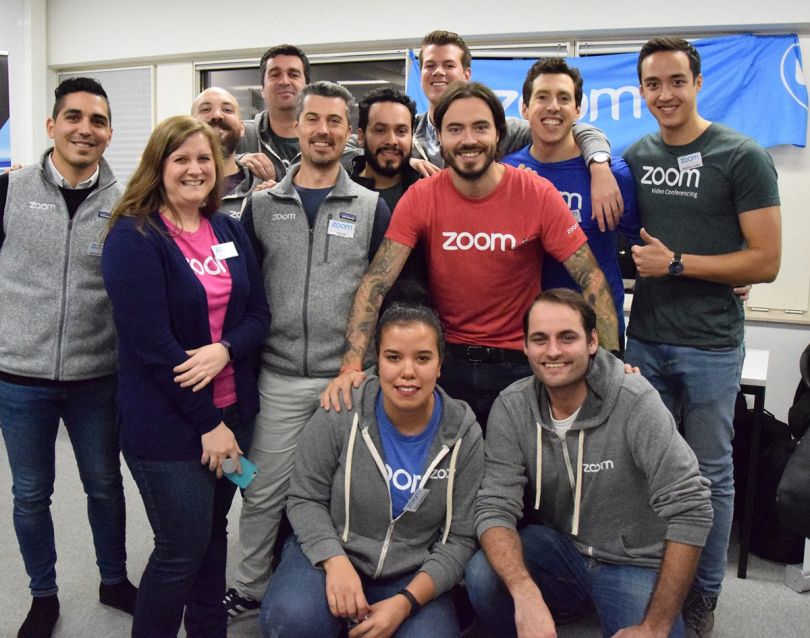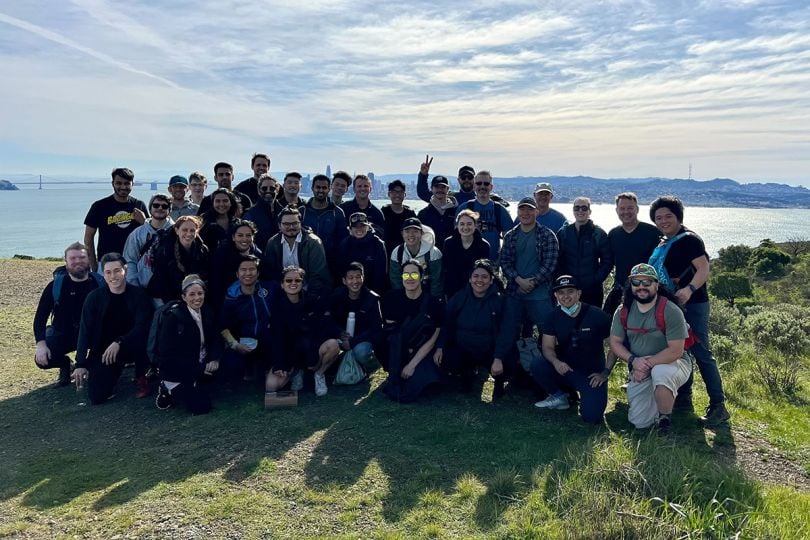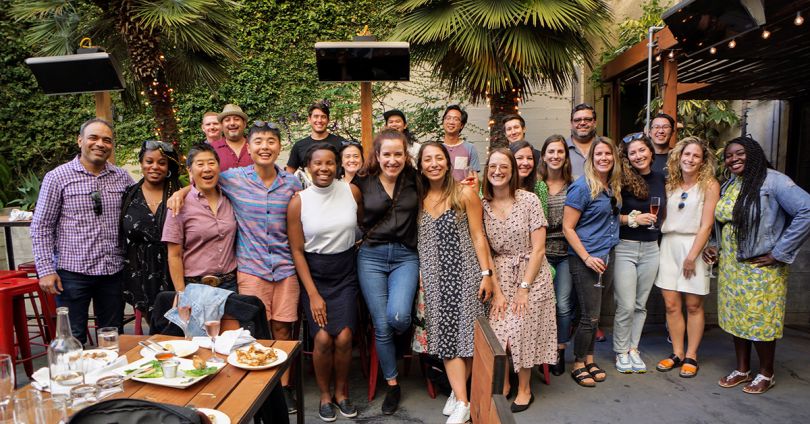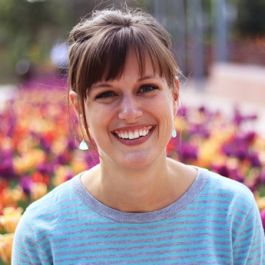Women working in the male-dominated industry of tech have leapt over many hurdles to get to where they are — but they haven’t had to do it alone.
While advocating for yourself, speaking out and taking up space instead of moving aside are individual expectations for women to achieve success in their careers, many attribute their success to support systems built by fellow women in their corner. After all, women still remain underrepresented in multiple STEM fields, making up only 15 percent of jobs in software engineering and 25 percent in computer science, according to 2021 statistics from the Pew Research Center. In a massive tech capital like Silicon Valley, embracing lessons from the women leaders who previously forged their own paths can act as a guidebook to raising each other up.
Sometimes empowerment comes in the form of a manager who helped you grow professionally, or a colleague who pushed you to apply to a role you didn’t feel qualified for. Sometimes it requires looking a bit further outward from personal circles, like how Cisco Meraki’s PMO Manager Sara George admires Madeleine Albright as a trailblazer who helped shatter the glass ceiling.
For Trisha Kothari, co-founder and CEO at Unit21, that inspiration was found much closer to home. Growing up, Kothari said it was seeing the way her grandmother confidently navigated the world as an Indian woman and refused to conform to the status quo that has most shaped the trajectory of her career.
“She really commanded that high level of respect, despite the difficulties she faced during her upbringing,” Kothari said. “That degree of directness and honesty is something that I have worked hard to incorporate into our company culture.”
In recognition of International Women’s Day, Built In San Francisco caught up with George, Kothari and six other industry leaders to learn more about the women who have influenced their careers. From mothers and mentors to innovators who have left their own mark on history, the legacies of these women continue to transform the future of what’s possible.
Looking back on your career so far, is there a woman who has consistently inspired you?
Throughout my career, I have had the privilege of working alongside many amazing women: scientists, leaders and mentors. Having watched and learnt from them, their achievements have inspired me and so many others. One woman I want to mention is a dear friend, mentor and supporter, Su-Lin Wu.
We first worked together as scientists at Yahoo! and she is now a senior director at YouTube, leading a team of 200 engineers. She has had a huge technical impact on the organizations she’s worked for, but what’s most inspirational about her is her reputation among those she has led as being one of the best leaders they’ve worked for. She truly cares about her team and that has turned out to be her secret to driving incredible business impact and success.
As a friend, she’s always candidly given me feedback whenever she’s seen me holding myself back, and has also been a sounding board for new initiatives or opportunities. In addition to all this, she works tirelessly to mentor women around her, has an incredible work ethic and continues to grow as a strong technology leader. For over a decade, I have observed and been inspired by her, and aspire to be as great a leader as she is.
Take those breaks and don’t hesitate to recharge by letting go of the gas pedal.”
How have you incorporated the lessons and achievements from her life and career into your own?
Each of the women I admire treated their careers as a long game and did not subscribe to the notion that to be successful in technology, you needed to be aggressive and more like the men around you. It felt great to dispel the notion that I could never take my foot off the career gas pedal if I cared about being successful. Instead, I embrace the fact that there will be times in my life when career won’t be the top priority, and there might be a need to take a break to focus on something more important. I encourage everyone to take those breaks and don’t hesitate to recharge by letting go of the gas pedal — the self-awareness and insights we can gain from those experiences will prove to be invaluable when it comes time to step up as a leader.

Looking back on your career so far, is there a woman who has consistently inspired you?
Wei Li is the one. She is currently the Head of Zoom Events and Webinar at Zoom. She incubated OnZoom as a consumer-oriented e-commerce platform and launched Zoom Events as an all-in-one event platform as a new product. I have been working on her team for two years and am constantly inspired by her incredible passion of building a product that can address the real needs of users and customers, and tackling a complex real-world problem by simplification and iterative innovation.
She shows us how to lead by example, and especially what it takes to lead teams in different sites and time zones effectively — by being respectful, considerate and communicative. In addition, she always uses real-world examples to instill the “customer first” mindset in all of us and inspire everybody to thrive for customer happiness.
I am encouraged by her to advance my own leadership skills.”
How have you incorporated the lessons and achievements from her life and career into your own?
As an engineering lead on her team, I am encouraged by her to advance my own leadership skills through leading by example, fostering goal-oriented team collaboration and supporting career development goals of individual engineers. I am also quite inspired by the way Wei shares her thinking process and motivates the team to embrace the same value.
For example, one of our EU customers raised an urgent feature request just a few days before their scheduled conference. We quickly came up with a workaround that met their needs. Wei shared with us her findings on this customer’s pain points and led us to realize that we as the product team shall always “be empathetic to our event hosts and users.” Through various exercises led by Wei similar to this one, I have learned that the best way to build a frictionless end user experience and deliver customer happiness is to always motivate every team member to think from customers’ perspective. Then, streamline a process that diligently validates customer needs and incorporates customer feedback into every step of our product development life cycle.
Looking back on your career so far, is there a woman who has consistently inspired you?
I have always been inspired by Madeleine Albright, best known as the first woman Secretary of State and the highest-ranking foreign-born U.S. Cabinet member alongside Henry Kissinger. Dr. Albright is also a professor, businesswoman and seven-time New York Times bestselling author.
Dr. Albright’s incredible accomplishments in male-dominated fields — not to mention as an immigrant in an adopted land — show me the possibilities of what I can achieve. Her story gives me the courage to persevere in the face of new challenges, no matter how foreign my environment might feel to me.
Now when I step into a room, I am intentional about coming with a perspective — unafraid to bring it to the conversation.”
How have you incorporated the lessons and achievements from her life and career into your own?
I admire Dr. Albright’s tenacity and her example of what it means to dare to take up space in a world where it’s easier to move aside, especially as a woman. I was privileged to meet her while at graduate school and was challenged when she asked my opinion on a current political topic. I gave what I believed was a diplomatic response, stating that I could see many sides to the issue, but was quickly admonished with a recommendation to make up my own mind and hold an opinion.
While the feedback initially felt like a rebuke, it was invaluable in demonstrating two things to me. First, that diplomacy does not mean riding the waves of others’ whims but working with others to advance a real stance. Second, that I am allowed, and in fact needed, to take up space in holding and asserting my own views. While I had always strongly believed in the idea of women’s empowerment for others, I realized in that brief conversation with Dr. Albright that I wasn’t living it for myself. Now when I step into a room, I am intentional about coming with a perspective, always ready for it to be shifted with new information, but unafraid to bring it to the conversation.
Looking back on your career so far, is there a woman who has consistently inspired you?
The most inspiring woman — my greatest of all time — is certainly my mother. She inspires me every day in ways that would be hard to summarize in one short answer. There are also many great women who have inspired me with a similar impact as my mother, and one such woman is Dr. Anandibai Joshi.
Anandibai was one of the first female Indian doctors and the first woman of Indian origin to study and graduate with a two-year degree in western medicine in the U.S. She was born in times where women’s education was a taboo in India. Despite countless struggles and hardships, she persevered and achieved her dream to pursue medicine and become a doctor.
Her life story and achievements serve as an inspiration for generations with great learnings of exemplary courage to go against all the odds, making brave choices throughout her entire journey as every step of it was a big struggle.
While we are in a better age where gender stereotypes are changing, there is still a lot of work to be done across the world for women’s education and gender equality. Inspirations like her reinforce the belief that change is possible — one just has to dream, persevere and put in the effort no matter the struggle
Innovation is crucial for any growth and happens by being open to all kinds of possibilities, perspectives and ideas.”
How have you incorporated the lessons and achievements from her life and career into your own?
Some of my key learnings from Anandibai’s life are: Be fearless, never give up, fight the struggle, drive things with patience, practice perseverance and determination, and work for the betterment of people. These qualities and lessons are a perfect recipe for any successful accomplishment, be it pursuing goals, effective leadership or organizational management. There are many instances throughout my career and in my day-to-day life where I see myself applying these learnings.
One example that I very commonly encounter are situations or processes with the underlying messages, “That’s just how things are” or “That’s the way things are done around here.” Institutionalizing rigid practices can hurt the productivity of people and hinder creativity. I am very fearless when it comes to this and never afraid to question or push back on such status quos. Just because something is done a certain way, even if it might work to some degree, doesn’t mean that it is the best way. I don’t settle on any conclusions until it logically resonates with me and all the possibilities are addressed. Innovation is crucial for any growth and happens by being open to all kinds of possibilities, perspectives and ideas.
Looking back on your career so far, is there a woman who has consistently inspired you?
So many women have inspired me that I can’t name just one! So instead I’ll give shout-outs to three.
First, there’s Allison Mnookin, who leads with a wonderful balance of head and heart. I still remember the lofty goals she set for me and the coaching and support she provided to help me achieve them. Then there’s Ginny Lee, who’s a master of creating processes and systems that enable entire companies to “row in the same direction.” Finally, there’s Karen Peacock, who is a tremendous communicator and strategic thinker. She taught me how to distill a lot of ambiguity into crisp, clear business cases and strategies.
I think of Allison Mnookin almost every day as I work with my team, aiming to push them to achieve great things for our customers while also providing them coaching and support.”
How have you incorporated the lessons and achievements from her life and career into your own?
In my current role at Side Inc, I’ve drawn from each of these great leaders the following traits.
The first is strategy. As I gear up to update our product vision and strategy, I’m keeping the lessons I learned from Karen Peacock in mind: Create a big, inspiring vision, and then break it into bite-sized pieces that will motivate and give confidence to the organization.
The second is process. All of us in Side’s R&D organization have come from different backgrounds and are used to working in different ways. I’m channeling Ginny Lee as I work with my cross-functional peers on a side product delivery system to clarify expectations and make it easier for everyone to do their best work.
Last but not least, it’s the people. I think of Allison Mnookin almost every day as I work with my team, aiming to push them to achieve great things for our customers while also providing them coaching and support.

Looking back on your career so far, is there a woman who has consistently inspired you?
A woman who has consistently inspired me throughout my career is my grandmother. I lived with her from the time I was born until I turned 18, and what I love most about her is that her entire life is a testament to the unwavering human spirit. She was born in a small village in India in 1930 and was only educated through the second grade. She married at age 14 and had three children by the time she was 28.
What I find most inspiring is the fact that even though she was raised during a time of strong patriarchy, she became a well-respected female head of the family who was extremely sharp and relentlessly focused on excellence. All of the children within her household were educated to the highest possible standard, and she really commanded that high level of respect despite the difficulties she faced during her upbringing — greater than anything I’ve seen here in Silicon Valley.
That unwillingness to conform one’s self for the sake of pleasing others is something that I value and have worked hard to incorporate into our company culture.”
How have you incorporated the lessons and achievements from her life and career into your own?
A few lessons that I’ve adopted from my grandmother and weaved into my own career have to do with how she navigated her world. Even though she grew up in circumstances that are unimaginable today, she was never a statistic and never viewed herself as a weak person or a victim. She was a strong, intelligent, hard-working, sassy matriarch. And she was unafraid to be her true self, whether others liked it or not. That degree of directness, honesty, and unwillingness to conform one’s self for the sake of pleasing others is something that I value and have worked hard to incorporate into our company culture at Unit21.
Looking back on your career so far, is there a woman who has consistently inspired you?
Sometimes you meet people, instantly click with them and know they will be in your corner for life. Karen, my former manager at a previous employer, was actually not that — our first interactions actually felt a bit awkward to me. However, she grew to become one of the most trusted and impactful individuals in my life.
Karen could bring out the best of each individual at work. Instead of seeing people just as resources, she truly saw them as people first. She’d listen and observe and really pick up on what makes you tick, or what ticks you off. Then she would act on it without you having to seemingly say anything — sometimes rolling up her sleeves and joining you in the trenches to fix something, sometimes randomly giving you some small thing that would actually mean the world to you. After so many encounters like this, Karen turned into manager, mentor, career coach and friend all wrapped up in one.
In watching Karen, I learned how seeing the people side of everything was the key to unlocking everything: greater team happiness, better execution, better results.”
How have you incorporated the lessons and achievements from her life and career into your own?
Prior to working for Karen, I saw my professional advancement and personal success as being tied to the measurable results I could drive. So I used to hold my teams to a high standard to deliver outcomes, and myself to an impossibly higher one. I used to focus on the work before thinking of the people. But, in watching Karen, I learned how seeing the people side of everything was the key to unlocking everything: greater team happiness, better execution, better results.
I began to see the end users we were serving less like metrics that needed to be moved and instead as individual humans. I found that empathizing with them at a human level ultimately made for a better product — something that was more inclusive, more equitable, and better fit into their lives and mental models. And with the better product, the results and metrics we hoped would be 10 times greater.

Looking back on your career so far, is there a woman who has consistently inspired you?
In graduate school, I joined a Stanford Women in Engineering mentorship program, and had the opportunity to first meet Deb Kilpatrick. Deb’s career has consistently inspired me, and now almost two decades later, I’ve had the incredible opportunity to work closely with her on the leadership team at Evidation Health.
Deb holds a PhD in mechanical engineering from Georgia Tech, and has had an impressive career that has spanned tackling technology challenges in the aerospace industry from working on the F22 Raptor, to making important contributions to healthcare by developing early cardiac stent technologies at Guidant, pioneering novel ways to use genomics at CardioDx, and creating new ways to measure health in everyday life Evidation Health.
I’ve always been inspired that Deb pays it forward. She consistently shares her time through mentorship, serving as a director for the Task Force for Global Health, or serving on the Georgia Tech and Cal Poly Engineering advisory boards. It’s easy to understand why she was named to Business Insider’s Most Powerful Women Engineers. Deb has shown many that the words “powerful,” “women” and “engineer” all belong in the same sentence.
Deb’s career has taught me that engineering training builds an analytical framework that transcends specific industries or jobs.”
How have you incorporated the lessons and achievements from her life and career into your own?
I’ve learned a tremendous amount from Deb, but a few things stand out. First, control the controllables. If you can differentiate what is within your control, you can spend more of your energy to take action there and simply manage risks against the rest. A key driver of my success at Evidation Health has been to focus on what truly moves the needle for our company, especially when the world around you is full of distractions.
Second, engineering is an approach to solving problems. Deb’s career has taught me that engineering training builds an analytical framework that transcends specific industries or jobs. At many points in my career, this has given me the courage to change trajectory to a different industry or to a different type of role altogether. At each shift, I’ve moved forward with confidence that my career path doesn’t always have to be obvious and linear, and that some of the best growth comes from being uncomfortable.
Lastly, you can change the conversation. Instead of being discouraged that women’s voices were often underrepresented in medical technology, Deb and a small group of women co-founded MedtechWomen, which is about to host the 10th year of the MedtechVision conference in 2022.




















